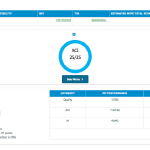ATLANTA—Despite a downpour outside, ACR and ARHP leaders enjoyed sunny news about the Rheumatology Informatics System for Effectiveness (RISE) Registry at the on Jan. 21. RISE now includes data on more than 4 million patient encounters, and attendees were charged with thinking of ways to increase utilization of the registry and better use its valuable information.
“We now have a fair amount of information that we would never otherwise have had,” said Salahuddin “Dino” Kazi, MD, chair of the ACR Committee on Registries and Health Information Technology. “In the next three to four months, we’ll have data on 1 million patients, which will make RISE a phenomenal database.”
RISE Functions & Stats
Launched in 2014, RISE utilizes rheumatologists’ electronic health record (EHR) data to report on quality of care and meet new requirements for reimbursement under the Medicare Access and CHIP Reauthorization Act of 2015 (MACRA). RISE passively extracts data on patient encounters and needs no dual data entry, said Jinoos Yazdany, MD, MPH, chair of the RISE Research & Publications Subcommittee.
As of Jan. 12, RISE has:
- 764 participating rheumatologists, including 594 that provided full data;
- Data on 889,628 patients, including 181,030 rheumatoid arthritis patients; and
- 4,325,790 patient encounters.
Researchers have analyzed RISE data for publication in , a poster presentation at the 2016 EULAR Annual Congress and oral plenary presentations at both the 2015 and 2016 ACR/ARHP Annual Meetings.
“We’ve created a national learning network of rheumatologists to improve quality and outcomes,” said Dr. Yazdany. RISE can provide data for fellows to use in quality-improvement projects, simplify and improve quality reporting and, through its data dashboard, offer members real-time comparisons of their quality scores with other users nationwide.
The Next Steps
RISE’s infrastructure will support many practice improvement, research and advocacy initiatives, and “as we think about how to do population health management, this tool will be critical in doing that more efficiently,” Dr. Yazdany said. In the future, RISE data may be used for drug surveillance efforts, and to help rheumatologists demonstrate the value they provide to insurance companies.
We want to continue to provide RISE as a free resource to rheumatologists and to use its data to advance rheumatology,” said Dr. Yazdany. “We’ve entered the age of big data. RISE is big data.”
____________________________________________________________________
Susan Bernstein is a freelance medical journalist based in Atlanta.



